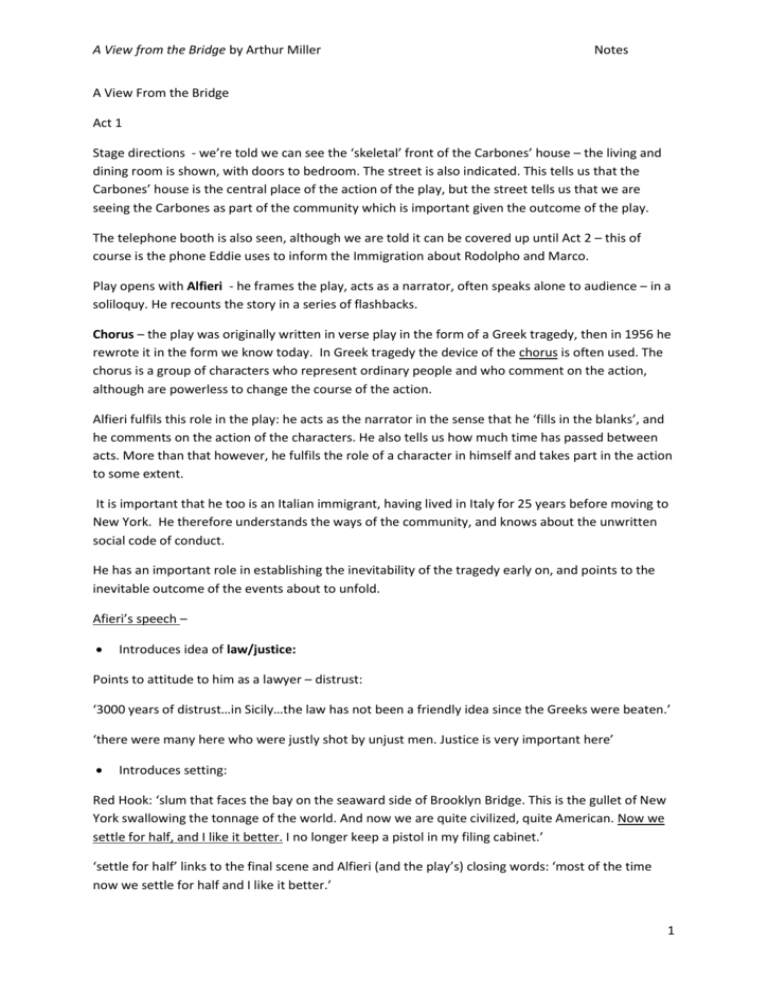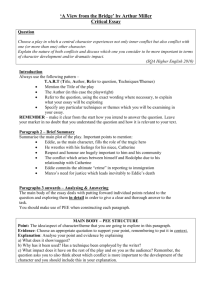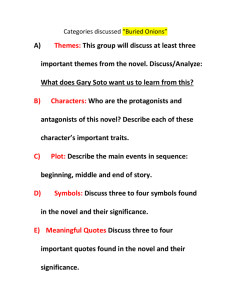Int2aviewfromthebridge
advertisement

A View from the Bridge by Arthur Miller Notes A View From the Bridge Act 1 Stage directions - we’re told we can see the ‘skeletal’ front of the Carbones’ house – the living and dining room is shown, with doors to bedroom. The street is also indicated. This tells us that the Carbones’ house is the central place of the action of the play, but the street tells us that we are seeing the Carbones as part of the community which is important given the outcome of the play. The telephone booth is also seen, although we are told it can be covered up until Act 2 – this of course is the phone Eddie uses to inform the Immigration about Rodolpho and Marco. Play opens with Alfieri - he frames the play, acts as a narrator, often speaks alone to audience – in a soliloquy. He recounts the story in a series of flashbacks. Chorus – the play was originally written in verse play in the form of a Greek tragedy, then in 1956 he rewrote it in the form we know today. In Greek tragedy the device of the chorus is often used. The chorus is a group of characters who represent ordinary people and who comment on the action, although are powerless to change the course of the action. Alfieri fulfils this role in the play: he acts as the narrator in the sense that he ‘fills in the blanks’, and he comments on the action of the characters. He also tells us how much time has passed between acts. More than that however, he fulfils the role of a character in himself and takes part in the action to some extent. It is important that he too is an Italian immigrant, having lived in Italy for 25 years before moving to New York. He therefore understands the ways of the community, and knows about the unwritten social code of conduct. He has an important role in establishing the inevitability of the tragedy early on, and points to the inevitable outcome of the events about to unfold. Afieri’s speech – Introduces idea of law/justice: Points to attitude to him as a lawyer – distrust: ‘3000 years of distrust…in Sicily…the law has not been a friendly idea since the Greeks were beaten.’ ‘there were many here who were justly shot by unjust men. Justice is very important here’ Introduces setting: Red Hook: ‘slum that faces the bay on the seaward side of Brooklyn Bridge. This is the gullet of New York swallowing the tonnage of the world. And now we are quite civilized, quite American. Now we settle for half, and I like it better. I no longer keep a pistol in my filing cabinet.’ ‘settle for half’ links to the final scene and Alfieri (and the play’s) closing words: ‘most of the time now we settle for half and I like it better.’ 1 A View from the Bridge by Arthur Miller Notes ‘now’ contrasts with ‘in those days’ – days of Al Capone and Frankie Yale ‘and yet…’ signals something different, something out of ordinary, beyond mundane. Points to something bad/tragic events. ‘powerless as I, and watched it run its bloody course’ – Alfieri is looking in, unable to stop what happens, what he knows is bound to happen. Inevitable. Sense that history repeats itself. This tragedy is not a new story – families have been feuding for centuries. Clear sense of Italian-American identity within community. Page3 Introduces Eddie, the protagonist. Alfieri leaves. Protagonist = principal character and actor. Often used to refer to the leading character as ‘hero’. Doubtful whether we could call Eddie a ‘hero’. Eddie works at the docks. Immediately we are introduced to the relationship between Eddie and Catherine (note – not Beatrice). Eddie is pleased to see Catherine. Catherine is desperate for Eddie’s approval – she keeps saying ‘you like it?’ when he comments on her hair and clothes. Eddie comments that she ‘looks like one of them girls that went to college’. The conversation continues, and Eddie begins to reproach Catherine for the way she looks: ‘I think it’s too short, aint it?....you been givin’ me the willies the way you walk down the street, I mean it. …I’m telling you, you’re walking wavy…I don’t like the looks they’re giving you in the candy story….The heads are turnin’ like windmills.’ … (p4) Eddie doesn’t want Catherine to get male attention, or to draw this attention to herself. She’s growing up, but is very much protected and cocooned by Eddie. ‘you aint “all the girls”’ – Eddie sees C as someone special, doesn’t want to see her as ‘all the rest’. ‘I’m responsible for you. You’re a baby, you don’t understand these things’. ‘you’re getting to be a big girl now, you gotta keep yourself more, you can’t be so friendly.’ = contradiction. In some ways Eddie talks about Catherine growing up, yet in other ways her treats her like a child. We’re told that Catherine is ‘almost in tears because he disapproves’ – she looks up to him, values his opinion, desperate for his approval. 2 A View from the Bridge by Arthur Miller Notes Page 5 - Eddie tells Beatrice that her cousins have arrived from Italy on a ship. She is ‘half in fear, half in unutterable joy’. She begins to worry that that she didn’t buy a new tablecloth but Eddie tells her ‘they’ll think it’s a millionaire’s house compared to the way they live.’ This tells us how poor the immigrants are that they will consider a modest house like the Carbones’ house to be luxurious in comparison to the situation they’ve left behind in Italy: ‘You’re savin’ their lives, what’re you worryin’ about the tablecloth? They probably didn’t see a tablecloth in their whole life where they come from.’ Eddie tells his wife not to worry, but warns her ‘if everybody keeps his mouth shut, nothin’ can happen’. This points to the serious nature of what they are doing in letting the cousins stay. The cousins are illegal immigrants, and will be immediately deported if caught. They are breaking the law in being in America without the correct papers. Eddie also comments on how it’s an honour for him to be able to offer them somewhere to stay, putting himself in their position. Page 8: Beatrice and Catherine excitedly tell Eddie about Catherine’s new job, but Eddie reacts badly. He says ‘it’s not wonderful. You’ll never get nowhere unless you finish school. You can’t take no job.’ He wants her to finish her education and get a good job, preferably (for him) away from the sailors and the longshoremen: ‘ I want you to be with different kind of people. I want you to be in a nice office...I mean if you’re gonna get outa here then get out; don’t go practically in the same kind of neighbourhood.’ Beatrice then tries to reason with Eddie, saying: ‘Look, you gotta get used to it, she’s no baby anymore...she’s seventeen years old, you gonna keep her in the house all her life?...I don’t understand when it ends.’ This makes it clear to the audience that Eddie is trying to hang on to Catherine, to not allow her to grow up, and therefore leave him. Eddie tells Catherine she can take the job. He calls her a ‘madonna’, again referring to her appearance. Catherine is very emotional: clearly his permission or approval means a lot to her. He is also emotional, but covers it. The stage directions tell us Eddie has ‘a sense of her childhood, her babyhood, and the years’. He has brought her up from a small child, and is unwilling to give her the freedom she should enjoy at her age. He then comments that once Catherine earns some money she’ll move away, but Catherine denies this. She too seems scared of moving on. He tells her not to trust people, but Beatrice instead says: ‘Be the way you are, Katie, don’t listen to him.’ Beatrice has more confidence in Catherine, whereas Eddie sees her as a baby, someone who can’t look after herself. He still feels the need to protect her, to shield her from others – men in particular. 3 A View from the Bridge by Arthur Miller Notes Page 12-13 – Eddie warns Catherine about the dangers of anyone finding out about the Beatrice’s cousins as they are illegal immigrants. He tells the story of Vinny Bolzano, a fourteen year-old boy who told the Immiigration Bureau about an uncle who was living with them illegally. When his family found out what he had done, they threw him down the stairs – ‘three flights his head was bouncin’ like a coconut’ – and they spat on him on the street. Eddie’s reaction to this is interesting, given that he himself does the very same thing as Vinny later in the play.: ‘You’ll never see him no more, a guy do a thing like that? How’s he gonna show his face?’ All three characters are horrified that Vinny would betray his own family in such a way, and to them characters what happened to Vinny seems reasonable and just. Yet, at the end of the play Eddie behaves as though they are treating him unjustly after finding out he informed on Marco and Rodolpho: ‘wipin’ the neighbourhood with my name like a dirty rag! I want my name.’ (p71) His name and reputation have been dishonoured in the community, just as Vinny Bolzano’s was for doing the same thing. He says to Catherine: ‘Just remember, kid, you can quicker get back a million dollars that was stole than a word that you gave away.’ Eddie gives this advice to Catherine, but it is more applicable to himself. Page 14 - The conversation moves back to Catherine’s job, and Eddie becomes quite emotional again, saying, ‘ I guess I just never figured on one thing... that you would ever grow up.’ Page 15 – Alfieri comes on stage as the narrator. He comments on the character of Eddie, saying ‘he was as good a man as he had to be in a life that was hard and even’. Here Alfieri functions as the chorus, commenting on the character without being involved in the action. He tells us that Eddie was basically a good man who worked hard for his family, despite his foolish actions later. Alfieri also functions as the narrator in that he tells us that the time has now jumped forward to ten o’clock, when the cousins arrive. Marco is described as ‘ a square-built peasant of thirty-two, suspicious, tender and quiet-voiced’. It is Marco that does the talking at first. We learn that Marco is married with three young children aged 4, 5, and 6. He wants to stay in America for 4-6 years to earn enough for his family. They have come from Sicily where there is no work and the situation is so bad that there is nothing for the children to eat: ‘I tell you the truth, if I stay there they [the children] will never grow up. They eat the sunshine.’ (page 18) Marco is very keen to send some money back home as soon as he can. It is a huge sacrifice for Marco to leave his young family for such a long time, but he sees it as the only option. He becomes emotional as his feelings of gratitude to Eddie and his family for hosting them overwhelm him. Rodolpho is different to his brother. He says he wants to stay in America ‘forever’: ‘I want to be an American. And then I want to go back to Italy when I am rich, and I will buy a motorcycle.’ (page 19). Rodolpho has different priorities to Marco. He doesn’t have the responsibilities of family like Marco has. As Marco says: ‘he dreams, he dreams....when you have no wife you dream.’ (page20) 4 A View from the Bridge by Arthur Miller Notes Marco is a man of few words while Rodolpho jokes and tells stories. Marco appears much more serious, and in charge – he gives Rodolpho permission to sing and then later tells him to stop singing as Eddie is uncomfortable with it and is worried it will draw attention to them. Catherine goes and changes into high-heeled shoes, much to the disapproval of Eddie, who tells her to change them. Beatrice notices this, but just gives Eddie ‘a cold look’. As this scene develops we can see Eddie’s growing dislike of Rodolpho. On page 18 the stage directions tell us that Eddie is ‘coming more and more to address Marco’, as though he has no interest in what Rodolpho is doing. The stage directions also tell us that Eddie is ‘sizing up Rodolpho, and there is a concealed suspicion’ (page 22). This is fuelled by Catherine’s apparent admiration for him. Note Rodolpho says ‘all the girls’ including Catherine in his comment – this links back to Eddie’s comment no page 4 to Catherine – ‘you aint ‘all the girls’’. Eddie sees Catherine as someone special, and sees Rodolpho as not being good enough for Catherine. Catherine offers Rodolpho sugar, to which he replies, ‘yes! I like sugar very much!’ (page23) This is symobolic for them being attracted to one another, and Eddie’s face is ‘puffed with trouble’. There is a sense of trouble brewing here. Page 23 – Alfieri comes on stage again, fulfilling his role as narrator and chorus. He doesn’t speak for long, but we are told a lot in these few lines. We know weeks have passed. He tells us that Eddie now has a ‘destiny’ and ‘there was a future, there was a trouble that would not go away.’ In this way the audience is made aware that something bad is going to happen, just as at the start of the play. P23 The lights rise on Eddie and Beatrice. Eddie is anxious because Catherine and Rodolpho are still not back from the cinema. They talk about their different perceptions of Rodolpho. Beatrice says ‘What’s the matter with you? He’s a nice kid. What do you want from him?’ To which Eddie replies, ‘That’s a nice kid? He gives me the heeby-jeebies....You mean that’s alright with you? That’s gonna be her husband?’ The conversation continues in the same manner – Beatrice defending Rodolpho and Eddie making derogatory comments on his singing, hinting that he’s dyed his hair, and talking about the names the men at the docks call him (Canary). Eddie says ‘he’s like a wierd’. (p24) This escalates until Beatrice warns Eddie not to start anything. He replies, saying he won’t start anything, but says ‘for that character I did not bring her up’. Beatrice then moves onto her ‘other worries’ – the fact that she and Eddie have not slept together for three months. Eddie is unwilling to talk about this, brushing it off with ‘I don’t feel good’. Beatrice then tells Eddie that it’s time he let Catherine go, since she’s 18. Eddie says Rodolpho is taking Catherine for a ride, to which Beatrice replies, ‘all right, that’s her ride. What’re you going to stand over her til she’s forty?’ Beatrice recognises that Catherine is old enough to make her own decisions and mistakes, and knows that Eddie will not let her have her freedom. 5 A View from the Bridge by Arthur Miller Notes 6









